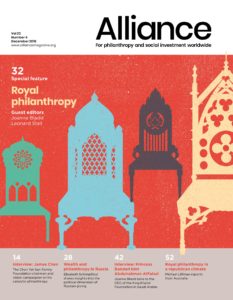The boundaries between public and private giving in the Gulf are hard to deduce
A recent Sunday Times investigation into Prince Charles’ charitable entities and the cash gifts they received from Hamad bin Jassim bin Jaber Al Thani (aka HBJ), the former Prime Minister of Qatar, has raised new questions about the division between public and private funds in the Gulf Cooperation Council (GCC) region. These questions are particularly pertinent given the rapid growth of regional giving. and its sheer size.
Precise figures are hard to come by, but anecdotal evidence suggests an increasingly active ‘impact’ space, notably in Saudi Arabia but also in the smaller member nations (Kuwait, Bahrain, Oman, the UAE and Qatar). In 2015 the size of GCC philanthropy was estimated at around $34 billion (albeit a figure skewed by the creation of Alwaleed Philanthropies and its initial pledge of $32 billion). Today, however, analysts are much more bullish suggesting that the true size of the sector is more likely in the hundreds of billions of dollars.
Beyond the size of the market, the real issue is the source of the capital. While more money for the chronically underfunded UN Sustainable Development Goals should be a good news story, the blurred lines between public and private philanthropy in the GCC make it difficult to identify the underlying origins of the money and hence the power, influence, and agenda behind it.
The vast majority of GCC philanthropy comes from private family businesses which represent around 90 per cent of the private sector economy, but these family businesses are often directly connected to the ruling regimes. They have little motivation to disclose their commercial financials, let alone their giving commitments. The situation is further exacerbated by the challenges of autocratic regimes keen to confiscate excess wealth and the oft-cited Islamic tradition that calls for alms anonymity. The ongoing obfuscation of what is public versus what is private creates a real conundrum.

For more on royal philanthropy, see Alliance magazine’s 2018 issue.
The Qatari gift to Prince Charles is a case in point. HBJ is a former politician and private individual but also a member of the ruling family. His gift is not unique. Saudi Arabia, the UAE, Kuwait, and Qatar have all channelled large-scale philanthropic gifts to western third sector institutions such as academia and NGOs through entities that may look and sound independent, but actually comprise predominantly government funds. Dubai Cares, Qatar Foundation and the Kuwait Foundation for the Advancement of Sciences are just some examples.
Indeed, the growth of GCC philanthropy is literally ‘well-oiled’, fuelled by the hydrocarbon wealth that characterises these rentier regimes. While the private sector is being actively encouraged to give more – Saudi Arabia’s Crown Prince Mohamad Bin Salman (aka MBS) recently announced the creation of an entire city dedicated to the third sector and his Vision 2030 development plan clearly calls for more private sector giving – the majority of the region’s large gifts are made by members of ruling families and thus, in essence, tied to the agenda of ruling regimes.
In Saudi Arabia, a plethora of new philanthropic foundations is due to come to market with global consulting brands working on their strategies. In the main, they emulate the model of MISK, the brainchild of MBS, which has an estimated $1 billion of assets under management but is, unsurprisingly, avoiding complex issues such as civil society and democratic reform in the country. The lucrative nature of advisory contracts means that new up-and-coming philanthropic entities are likely advised to do the same.
GCC regimes have long regarded the third sector with suspicion, conscious of its links to civic voice and its potential to challenge the political status quo. Awarded the accolade of ‘least conducive environment for philanthropy’ due to extensive government oversight and burdensome legal requirements, philanthropists truly committed to change, often register vehicles outside the region. That situation is changing as GCC governments recognize philanthropy as a source of developmental capital and innovation. But the predominance of large (ruling) family-owned foundations is a worrying trend if it stifles grassroots community initiatives and civic voice. As the region’s ruling regimes discover the soft power of “giving”, so the acceptance of these gifts by the likes of Prince Charles serves to endorse change-averse autocracies and negate the principle that philanthropy is about private capital for public good.
The author is a regional practitioner who wishes to remain anonymous to protect ongoing work in the region.





Comments (0)